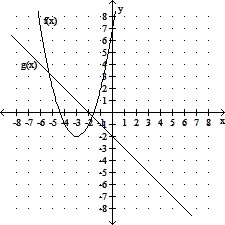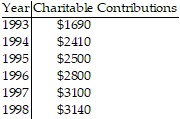Use the graph to evaluate the expression.Find (f + g)(-3) and (f - g)(-1).
A. (f + g)(-3) = -1; (f - g)(-1) = 1
B. (f + g)(-3) = 29; (f - g)(-1) = 17
C. (f + g)(-3) = -1; (f - g)(-1) = 3
D. (f + g)(-3) = -11; (f - g)(-1) = -15
Answer: C
You might also like to view...
Solve the problem.Find an upper bound for  in estimating
in estimating  with n = 6 steps.Give your answer as a decimal rounded to five decimal places.
with n = 6 steps.Give your answer as a decimal rounded to five decimal places.
A. 0.02473 B. 0.03148 C. 0.03308 D. 0.03935
Tell whether the expression is a monomial. If it is, name the variable(s) and coefficient, and give the degree of the monomial.10x4
A. Monomial; variable x; coefficient 4; degree 10 B. Monomial; variable x; coefficient 4; degree 0 C. Monomial; variable x; coefficient 10; degree 4 D. Not a monomial
Find the product, if possible.

A. 
B. 
C. 
D. Not defined
Solve the problem.Along with incomes, people's charitable contributions have steadily increased over the past few years. The table below shows the average deduction for charitable contributions reported on individual income tax returns for the period 1993 to 1998. Find the average rate of change between 1995 and 1997.
A. $320 per year B. $600 per year C. $300 per year D. $345 per year